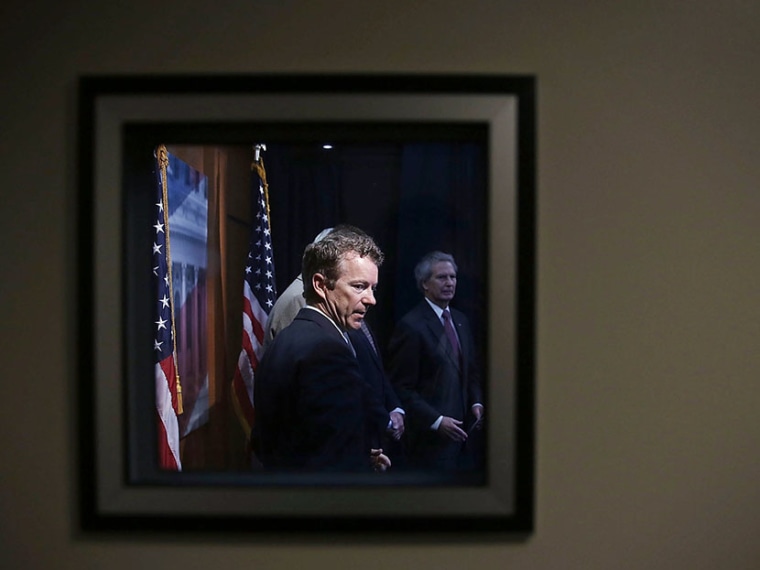If you didn’t read the conservative press you might think Kentucky Sen. Rand Paul was all but certain to be the GOP’s nominee in 2016.“Paul has emerged as a serious candidate,” the New Republic pronounced in June. “The most interesting politician in the country at the moment,” the Washington Post’s Chris Cilizza agreed. Time this year named Paul one of the 100 most influential people in the world, a list that includes only one other U.S. senator (Tom Coburn, R-Okla.). msnbc’s own Chris Matthews recently predicted, “the nomination is going to Rand Paul.”Given the extremism of Paul’s libertarian politics—most famously, he’s quarreled with the 1964 Civil Rights Act’s prohibition against discrimination by privately-owned businesses—one may reasonably suppose that most of the liberal and/or mainstream centrist pundits who tout Paul as a likely or even plausible presidential nominee would never dream of voting for him themselves. What they seem to overlook is that an awful lot of conservatives would never vote for him, either. Indeed, to judge from the conservative press these days, Paul’s fellow Republicans can’t stand him.It’s long been apparent that the GOP’s foreign-policy hawks don’t like Paul, a foreign-policy dove who attracted much attention in March for waging a 13-hour “talking” filibuster over U.S. drone policy. Arizona Sen. John McCain has called Paul a “wacko bird.” (McCain later apologized, and still later joked that if Paul and Hillary Clinton are the nominees, “it’s gonna be a tough choice.”) The Washington Post’s neoconservative blogger Jennifer Rubin has called Paul (among other things) “amateurish” and “downright dishonest.” Weekly Standard editor Bill Kristol has mocked Paul as the “spokesman for the Code Pink faction of the Republican Party.”
Related: Rand Paul defends 'talented' aide despite neo-Confederate ties
But in recent days it’s become clear that a lot of the economic conservatives who ought to be Paul’s natural constituents don’t much like him either. At issue is an interview Paul gave Bloomberg Businessweek’s Joshua Green in which Paul appeared neither to understand the late economist Milton Friedman’s monetarist theories nor to know that Friedman was deceased. It’s no surprise that liberals like Paul Krugman and Jonathan Chait jumped on Paul for his incoherent criticism of Fed policy (which Paul elaborated in National Review Online). But it was interesting to see conservatives like the American Enterprise Institute’s James Pethokoukis and National Review’s Patrick Brennan do the same.Indeed, if you want to keep abreast of everything that compromises Paul as a possible presidential contender, you should bypass liberal opinion mongers and objective mainstream news organizations altogether and focus on conservative news sources. The story that Paul aide Jack Hunter was a former neo-Confederate activist who boasted of toasting John Wilkes Booth’s birthday, which eventually led Hunter to resign, did not break in the Nation, but rather in the Washington Free Beacon, a web publication created by the very conservative Center For American Freedom. (Paul is quite testy about the matter.)The conservative press isn’t a bad place to keep track of dirt on Rand Paul’s father Ron, either. For instance, if you want to follow the story of a state senator’s claim that Ron Paul’s 2012 campaign bribed him to secure an endorsement, don’t go looking for it in In These Times. The place to go is the Iowa Republican, whose editor-in-chief is a political consultant and former political director of the Iowa Republican Party. (The Weekly Standard’s web site would also be glad to catch you up. Chris Wallace asked Ron Paul about the then-unsubstantiated allegations on Fox News Sunday in Jan. 2012.)
Related: Rand Paul denies he ever opposed Civil Rights Act
One might argue that all this hate Rand Paul and his family attract on the right merely confirms that he’s a maverick. (Indeed, one notable Paul fan on the right is Sarah Palin, who’s such a maverick that she dispensed altogether with serving out her term as Alaska governor .) The GOP had a hard time warming to Mitt Romney, too, mainly because as Massachusetts governor Romney enacted a health care program that became the blueprint for Obamacare. And less than a decade before Republicans nominated McCain to be their 2008 standard-bearer McCain was persona non grata in the GOP (and may or may not have flirted with the idea of becoming a hawkish Democrat).But Romney and McCain were disliked for being too moderate, something that the Republican primary electorate eventually recognized, in its grudging way, would be necessary to win in the general election. Indeed, in every election of the last quarter-century, Republicans nominated a moderate and then compelled him to impersonate a doctrinaire conservative on the campaign trail. It worked once with the first Bush and twice with the second (with the added benefit that Bush fils actually ended up governing from a position much further to the right than anyone expected). It failed with McCain, Bob Dole, and Romney.Twice since World War II have Republicans nominated a more doctrinaire conservative for president: Barry Goldwater in 1964 and Ronald Reagan in 1980 (and of course 1984). Conceivably the GOP might see Paul as a third such candidate. But Paul isn’t really a doctrinaire conservative; he’s a doctrinaire libertarian (much less so than his father, but doctrinaire by any other yardstick). That means a significant proportion of even doctrinaire conservatives will strongly disagree with Paul. Meanwhile, quite a few less-doctrinaire conservatives have already weighed in, and their judgment is pretty harsh.
